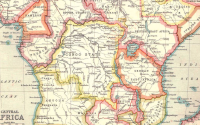2 April 2005Pepe Escobar Asia Times
Was it people power? Was it a coup? Or was it just the toppling of a clan? With the same lightning speed with which it materialized, the March 24 revolutionary object called the Tulip Revolution has disappeared like a comet in the geopolitical cosmos. For four days, Kyrgyzstan had two parliaments. Then last Monday the new Kyrgyz parliament appointed Kurmanbek Bakiyev as premier and interim president. Actually, this was happening for the second time, because Bakiyev had already been confirmed by the previous parliament, elected in 2000 and controlled by now-ousted president Askar Akayev. The agreement was nothing less than extraordinary, considering that the Kyrgyz parliamentary elections were rejected as a total fraud by the opposition and the few thousand Tulip revolutionaries who took a few buses, crossed the snowy passes of this Switzerland of Central Asia northward, and forced Akayev to flee to Russia. It gets curiouser. Bakiyev reneged on all he had said before - when he was forcefully calling for an annulment of the parliamentary elections. Instead, all the key opposition leaders - Bakiyev, the "people's" general, Felix Kulov, and former foreign minister Roza Otunbaeva - duly supported the new, theoretically fraudulent parliament. Parliamentary fraud will be - also theoretically - eradicated by a new election, but only "in a dozen electoral districts", according to the new premier. Bakiyev - a former prime minister - got his job back. Kulov - former head of the local KGB - was put in charge of security, the police and the army - he resigned in the middle of the week, saying "the situation was stabilized". And Otunbaeva is also back heading the Foreign Ministry. They are all former Akayev proteges. And they are all familiar faces in Washington. This was not exactly a classic revolution in the making - one order has fallen but a new one has not yet been born; it was rather "meet the new boss, same as the old boss". From Russia, Akayev blasted the new government as "illegitimate" on Radio Echo Moscow, and blamed everything on Islamic radicals, while also saying he would consider negotiating his resignation - but only with the Speaker of the new parliament, Omurbek Tekebayev. No wonder: Akayev's son Aidar, his daughter Bermet and his key adviser are among the new parliamentarians. Observers of the Bush doctrine and its correlated gospel of spreading "freedom and democracy" immediately noticed this was not color-coordinated with the Georgian velvet and Ukrainian orange revolutions. The romantic whiff of a rebellion of the disfranchised masses against widespread corruption by the elite quickly vanished. No old nomenclature swept away. Not a single opposition leader blaming Akayev for stealing their elections. Instead, the atmosphere reeked of backroom deals between Moscow and Bishkek. Mikhail Margelov, head of the Russian Federation Council's International Affairs Committee, got closer to the truth when he said that Moscow "welcomes revolutions of any color in Kyrgyzstan, except a green [Islamic radical] one". This means that the "new" Kyrgyzstan won't even be able to go hiking in the Tian Shan Mountains without the Kremlin's approval. The US State Department for its part did not lose any sleep over the legitimacy of the new government: "We're dealing with reality on the ground [in Kyrgyzstan] with the understanding that what happens should happen consistent with the rule of law, consistent with the will of the Kyrgyz people and supported by the international community." But the international community could not support anything because no one knew what was going on. The best is yet to come Russian analysts seem to have nailed the contrast between Georgia and Ukraine and Kyrgyzstan. Mikhail Saakashvili in Tbilisi and Viktor Yushchenko in Kiev were keen to integrate their countries into US and European economic and security spheres. And there was a strong anti-Kremlin element to their revolutions as well - although both leaders know they can't afford to alienate the Kremlin. None of these elements were visible in the Tulip Revolution. Boris Kagarlitsky, director of the Institute for Globalization Studies in Moscow, offers a more nuanced explanation: "As soon as Washington realizes that popular dissent is rising in a country and that regime change is imminent, it immediately begins to seek out new partners among the opposition. The success of this policy owes in part to the widespread belief that you're better off enlisting shady characters' support than crossing swords with them. The money invested in the opposition by various [non-governmental organizations] is a sort of insurance policy, ensuring that regime change will not result in a change of course, and that if change is inevitable, it will not be radical." For Kagarlitsky, Washington "works to maintain the status quo"; the Americans "understand that sometimes leaders have to change for policy to remain the same". Paradoxically, he adds, "Moscow is trying to achieve the very same thing. It fears serious changes in the former Soviet republics more than anything in the world." If the Tulip Revolution is a case of leaders changing and policy remaining the same, the new leaders may be up for a rude awakening quite soon. The Russian daily Nezavissimaia Gazeta has stressed "a backward step of 20 years" in Kyrgyzstan, abysmal economic degradation, and thus the possibility of "a new wave of instability and disorder. Without solving the old problems, the new leaders already have many enemies among the disenfranchised." Kazakhstan's Nursultan Nazarbaev, Uzbekistan's Islam Karimov, Turkmenistan's Saparmurat Niyazov and Tajikistan's Emomalai Rakhmonov will certainly need a lot of sedatives nowadays to get some sleep. Bush doctrine evangelists - whatever the outcome of the Tulip Revolution - are desperate for more regime change in Central Asia. Talking about revolution, we ain't seen nothing yet. The real deal could happen in Uzbekistan. Karimov - the Central Asian Saddam Hussein - better start preparing that escape route rolled up inside a Bukhara carpet.






